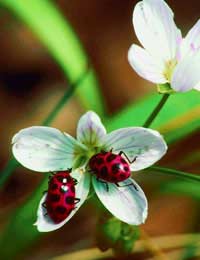Are GM Foods Destroying Biodiversity?

One of the main controversies around GM foods is the potential of these products to affect biodiversity. This is somewhat of a confusing area in the sense that it is a difficult one to assess and the effects tend to be long-term ones, rather than consequences that can be observed and measured in the short-term.
As such, it is challenging because a GM crop may be approved but problems relating to biodiversity will not be evident for some time afterwards. By that time, restoring biodiversity is a difficult if not impossible task.What is Biodiversity?
The concept of biodiversity refers to a wide variety of life forms. A geographic area that is said to have high biodiversity will have many different species that call the land their abode. The variety that exists within even a single species is also an important contributor to biodiversity. In an ecosystem that has a high level of biodiversity, there will be numerous interactions between the different species. These interactions tend to keep the biodiversity high and the range of species similarly broad. When the environment changes or it is disturbed to some extent, if there is a high level of biodiversity, the geographic area can usually withstand some degree of change. In this sense, an area of high biodiversity is generally a resilient one. Many experts will look to the biodiversity of an area to get a sense of the health of that particular ecosystem.GM Crops and Biodiversity
The act of growing crops typically means that wild plants in that farm will be removed. If weeds grow around the crops, it means that the crops will be competing for important and scarce resources such as light, water and the necessary nutrition from the soil. In turn, the farm will be less productive if weeds are left to grow. However, some level of wild plants can be helpful to the farm. If certain wild plants are left to grow, animals may consume them. These animals can then deter other pests on the farm. If a farm is carefully planned out and good growing practices are used, wild plants can exist alongside crops that grow well.With GM crops, however, they may have 'built-in' pest control or they may negatively affect the health of an animal that consumes the crop.
A concern is whether or not agriculture using GM crops can respect and maintain this important balance that supports a high level of biodiversity. There are a number of ways in which the biodiversity of an ecosystem could be compromised by GM crops. In the first, outcrossing can occur. This refers to a GM crop that passes on new traits to relatives in the wild. However, those relatives might be altered in such a way that they now have a completely new ecological role, causing them to 'out-compete' other species in the ecosystem.Another way in which GM crops might harm biodiversity relates to the use of only a small number of crop varieties. New characteristics that occur from genetic modification could be so advantageous that only a few crop varieties are used. In turn, there could be a greater number of outbreaks of disease or pests.
Also, any crop that is engineered to be resistant to pests or herbicides can influence biodiversity because it may not only affect the target insect. Instead, it could be harmful to insects that are not targets but still consume the crop. Not only that, but indirectly the GM crop could harm biodiversity through a reduction in the insects that serve as a source of food for another kind of wildlife such as birds.

Re: Fact Sheet: Pros vs Cons
BOOOOOOOM(explosion)
Re: Fact Sheet: Pros vs Cons
we all know that the flying spaghetti monster is our true saviour.
Re: Fact Sheet: Pros vs Cons
CAREFUL SPONGEBOB
Re: Fact Sheet: Pros vs Cons
OH YES DADDY AHH um anyways hi yall should message me xdxd
Re: The Public Perception of GM Foods in the UK
I feel extremely concerned at the very idea of GM foods. They have not been tested properly and probably nnever…
Re: A Career in Biotechnology
Great article. I just completed my biotechnology undergraduate degree and am very interested in working with genetically modified (GM)…
Re: Ethical Concerns and GM Foods
I do believe that god created GMO and that you will all feel his wrath open up.
Re: A Career in Biotechnology
What do you need to do with your time in school to pursue a LEGAL career in GMOs
Re: Fact Sheet: Pros vs Cons
The FitnessGram™ Pacer Test is a multistage aerobic capacity test that progressively gets more difficult as it continues. The 20 meter…
Re: Fact Sheet: Pros vs Cons
Yes yes the flying spaghetti monster is the religious figure we should all follow. Also Mr Plesa Hjelp Oh God we have sent help. help…